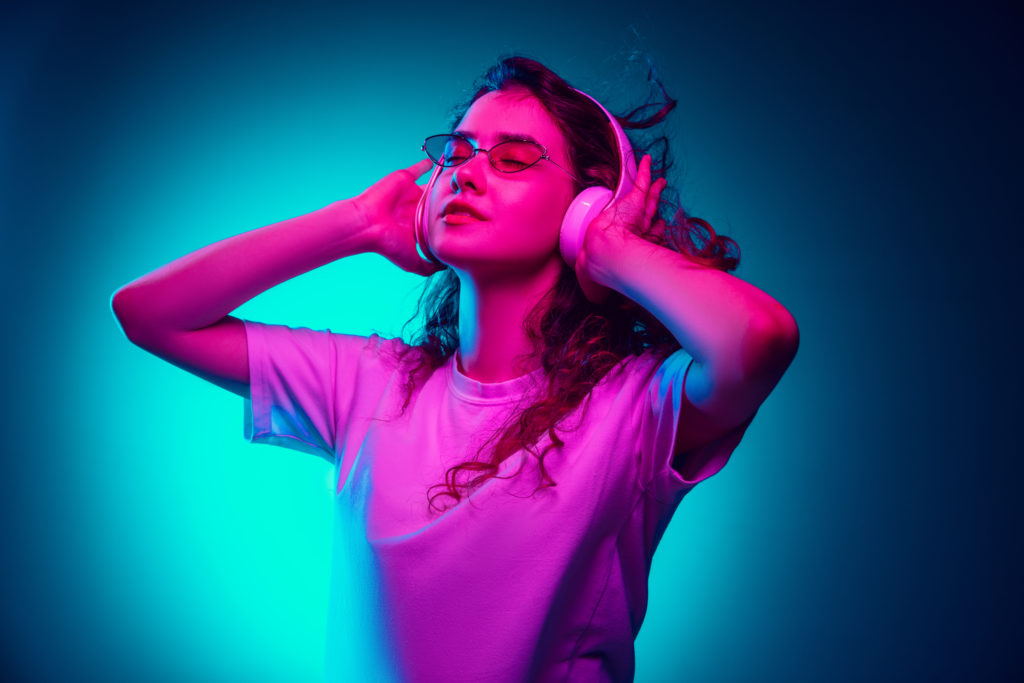MUSIC AS AN ASSET CLASS
Written by WOM writer on August 19, 2022
Streaming has revolutionized the way we consume music and revived the music industry in recent years after nearly two decades of a downturn. Global music revenue hit $26 billion in 2021 (its highest peak since the 90s!) and streaming continues to be the main growth driver, accounting for 65% of recorded music revenue worldwide.
As streaming consumption grows, so does the value of streaming royalty rights — and private equity firms and hedge funds are taking notice. They believe, like we do at Royal, that music is an attractive asset class, and they’re spending billions to cash in on the potential upsides.
It’s Royal’s core belief that the future of music is one where fans can participate in ownership and earn royalties alongside their favorite artists. That’s why we’re building a music rights platform that opens music ownership to the masses, allowing artists to sell a portion of their royalties in a song, EP, or album to the fans who believe in them.
In this guide we’ll cover:
◆Streaming’s surge to the top.
◆Music as a rising asset class.
◆What it means to own streaming rights.
◆How the royalties get to you.
Streaming’s surge to the top
Today, 523 million global listeners can discover music at the touch of a button through the power of streaming technology. They can also participate in music ownership through Royal and earn royalties as an artist grows in popularity across streaming platforms. A decade ago, the music industry looked a lot different.
In the early 2010s, the music industry was on a downward trajectory after Internet piracy decimated CD sales. Most music revenue at this time came from either physical albums or digital downloads.
Enter Spotify. The Swedish streaming platform expanded to the U.S. in 2011 and grew to one million U.S. subscribers in its first year. Ten years later, 28% of Americans report using Spotify every week and the platform has paved the way for competitors like Apple Music, Amazon Music, and Tidal.
Here’s a look at streaming’s impact on the world’s largest music market today:
◆83% of recorded music revenue comes from streaming in the U.S.
◆82 million+ Americans pay for on-demand music streaming.
◆U.S. listeners stream music for 75 minutes a day on average.
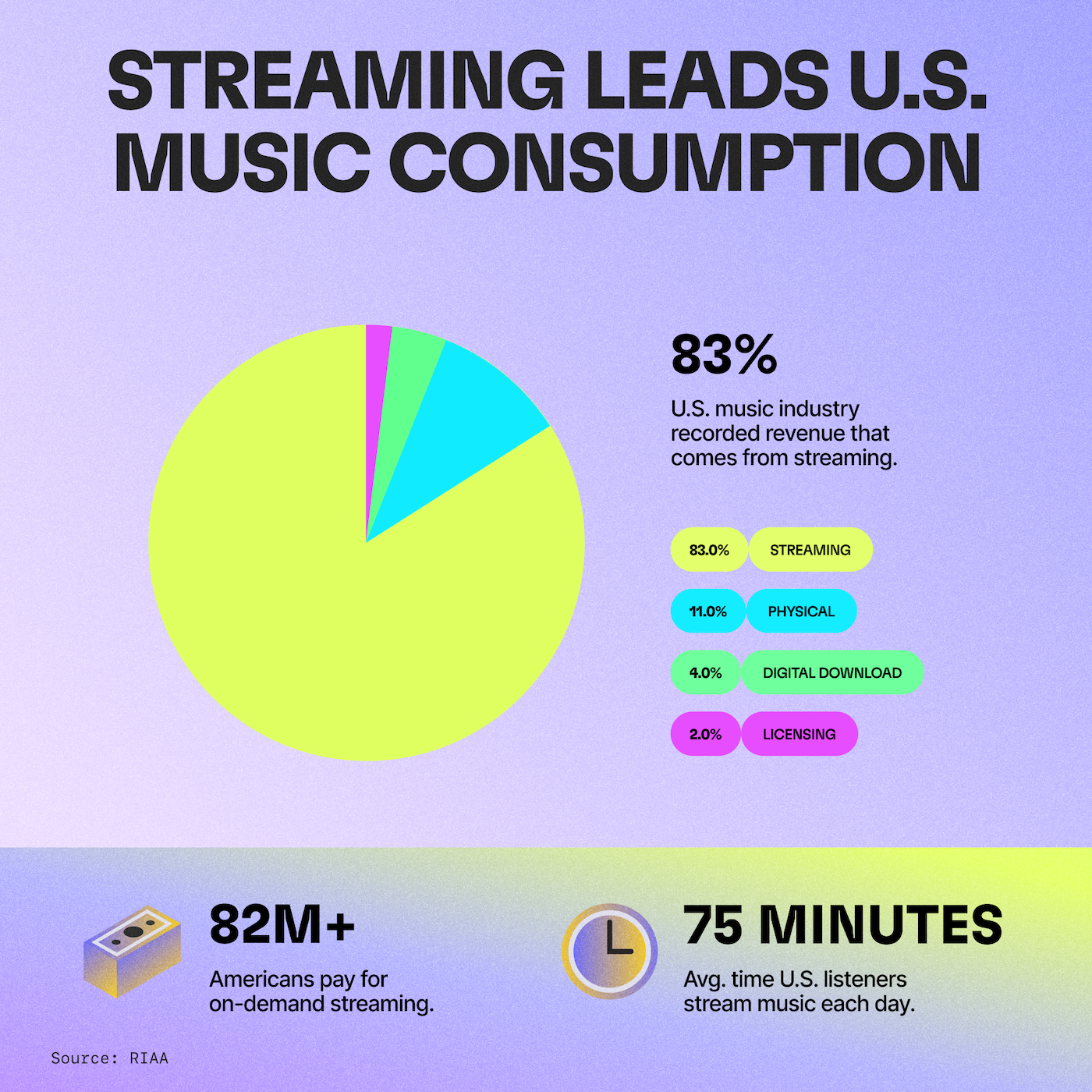
Music as a rising asset class
Experts are looking at streaming’s rise in the U.S. to predict growth in other emerging markets. This is because outside of major markets like the U.S. and Western Europe, streaming is just starting to grow in popularity. By 2026, emerging markets are predicted to represent the majority of global music subscribers.
Goldman Sachs forecasts that global music revenue will double by 2030, driven by global streaming volume, increasing prices, and technology advancements in developing markets. This growth trajectory is getting investors (and us) increasingly excited about music as an asset class, which is why private equity firms like Blackstone and KKR have spent billions of dollars acquiring song catalogs and streaming rights in recent years.
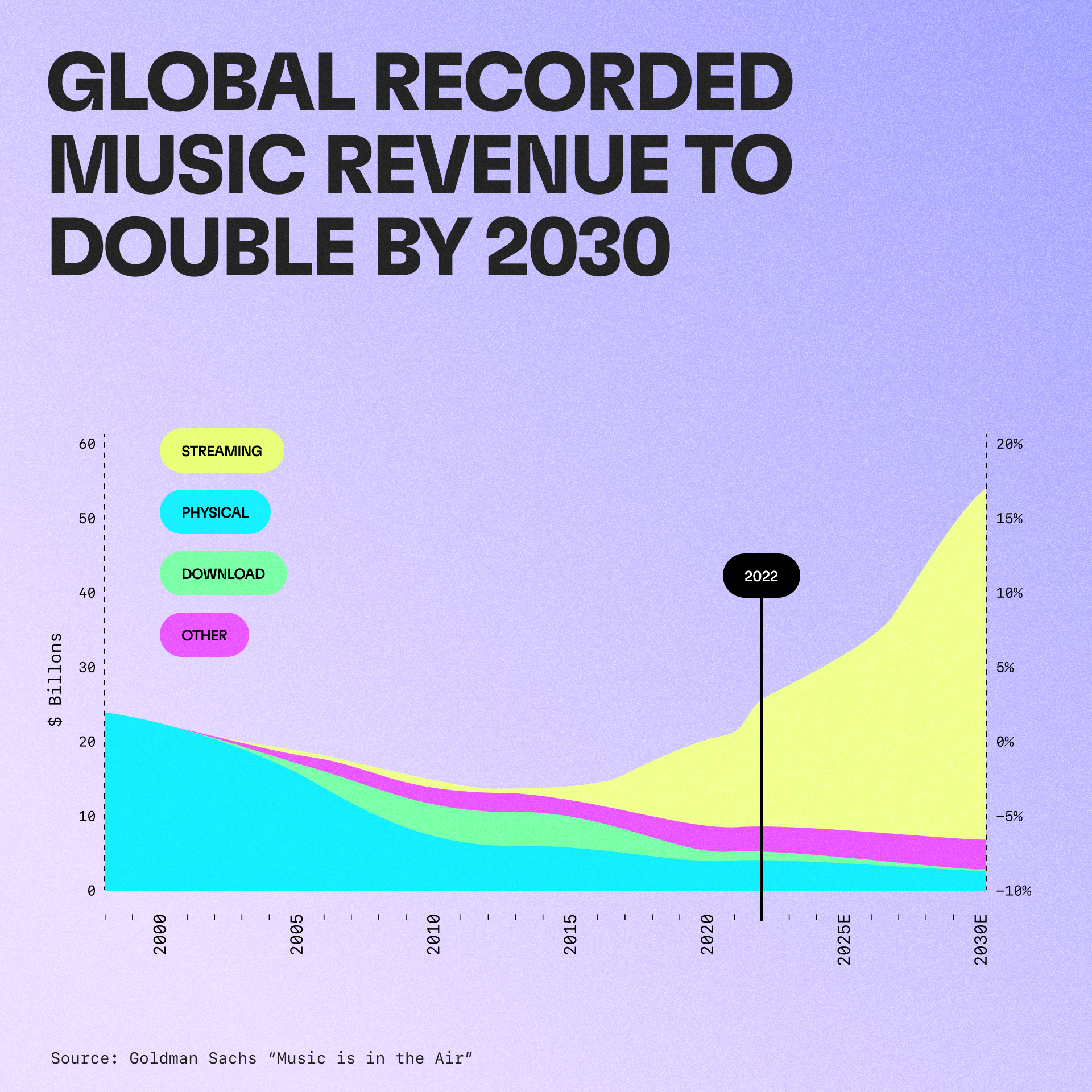
Additionally, recorded music revenue hasn’t historically been linked to consumer spending, so even during an economic downturn music revenue has potential for significant gains. In 2020, recorded music and publishing royalties grew despite the recession because private equity firms viewed music rights as countercyclical investments on a growth trajectory.
What it means to own streaming royalty rights
Traditionally, only record labels, publishers, private equity firms, and hedge funds have had the opportunity to purchase music rights from artists. Now, anyone can buy streaming rights through Royal by purchasing Limited Digital Assets (LDAs). These assets can also be purchased on secondary markets like OpenSea.
We believe there is real value in owning streaming royalties, despite media headlines that streaming doesn’t pay. The truth is streaming platforms do pay right holders, but unfortunately, most artists only own a small portion of their rights, if any.
Here’s a breakdown of the estimated payouts per stream on popular streaming platforms. It’s worth noting that rates per stream aren’t fixed, and they vary regionally based on how much income is collected each pay period.
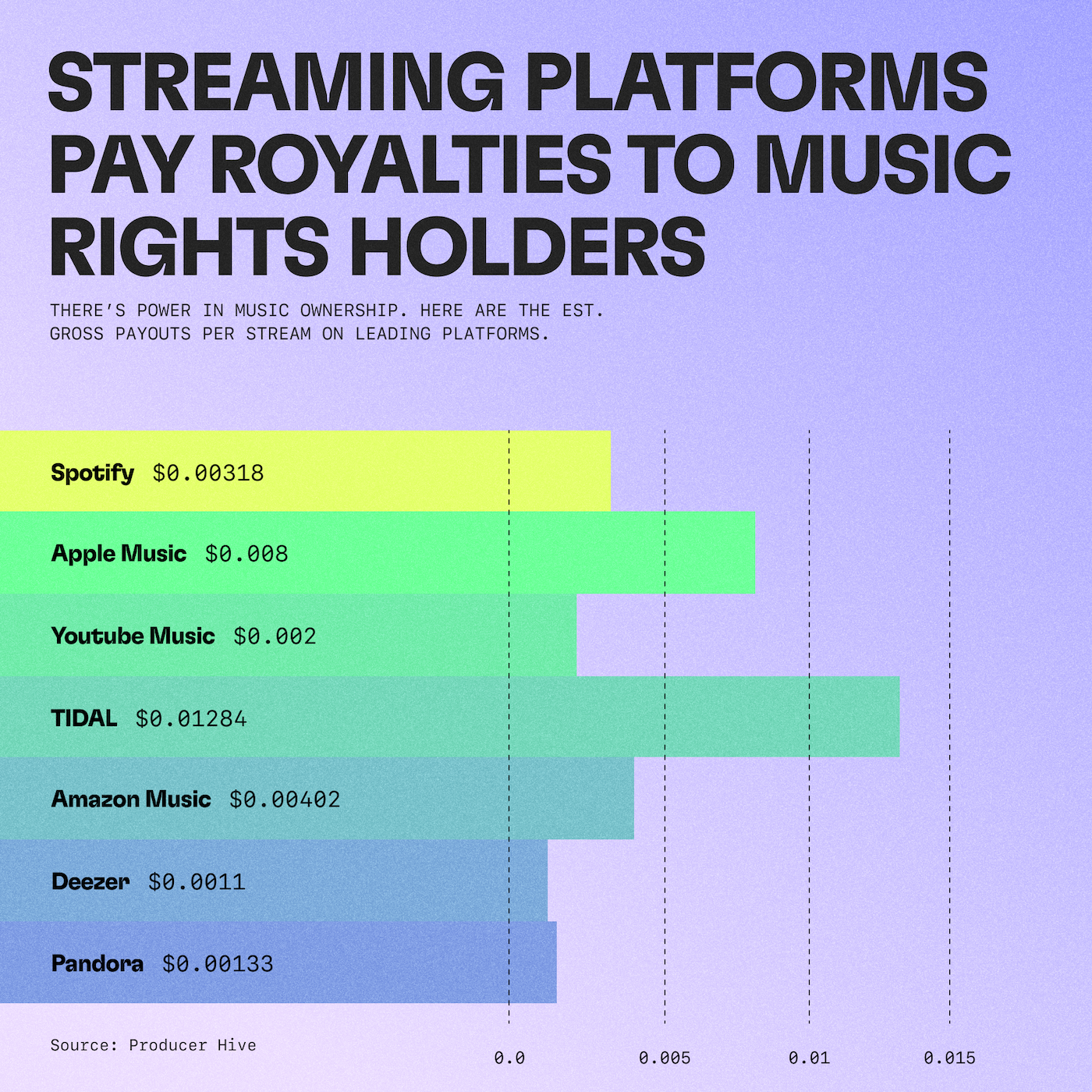
How the royalties get to you
When you buy music on Royal, you own a portion of a song’s streaming royalties (plus extras). These royalties accrue over time, and you’ll receive payouts alongside the artist for as long as you hold the token. If you sell your token, any accrued royalties that haven’t been paid out transfer to the next owner. Here’s how it works.
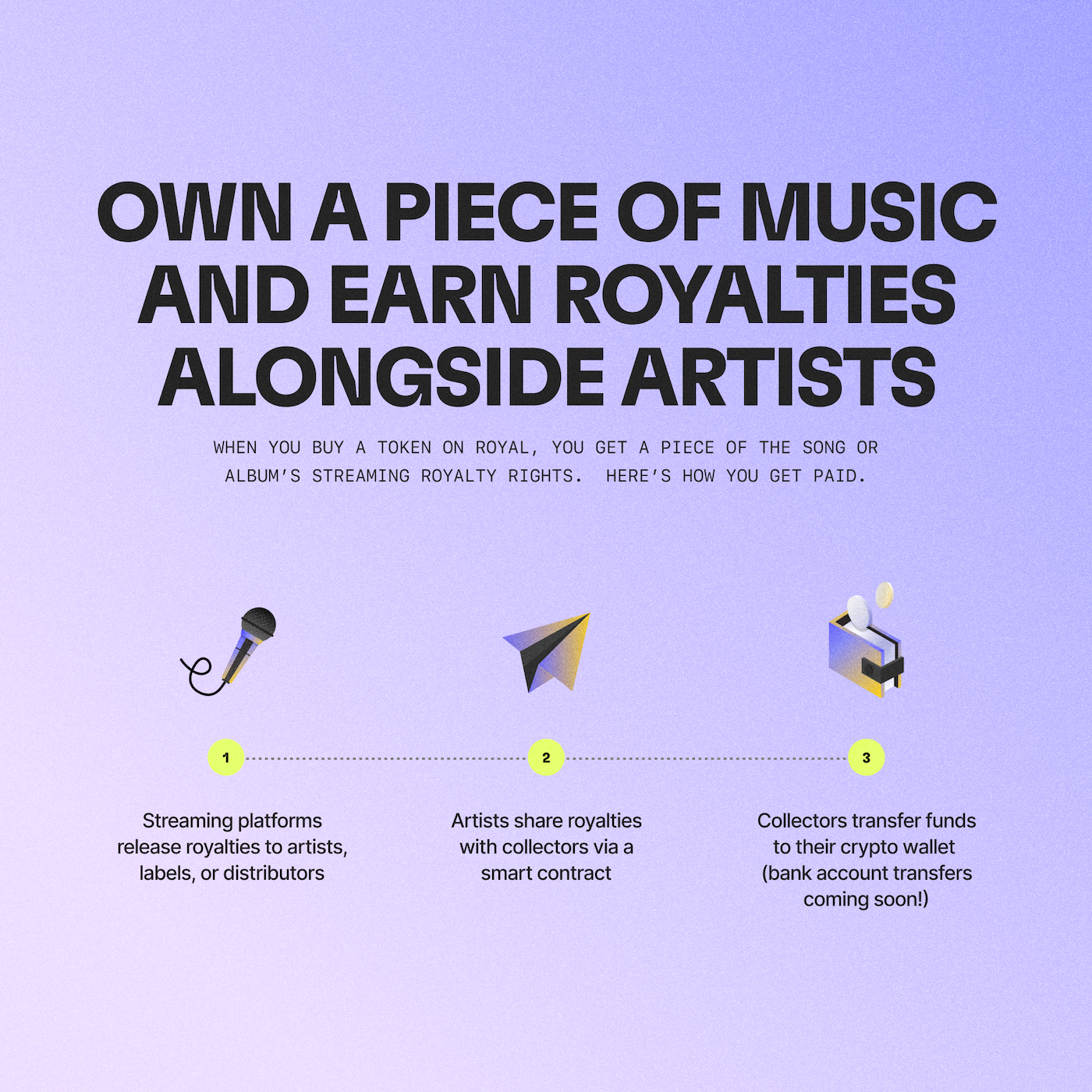
1. Streaming platforms release royalties to artists: Digital service providers (DSPs), such as Spotify, pay streaming royalties to an artist, either directly or through the artist’s record label or distributor, or both.
2. Artists share royalties with collectors via a smart contract: Once an artist receives the money, your portion of the royalties will be distributed to your Royal account through a smart contract, which is a self-executing contract stored on the blockchain. Payout timelines vary by artist — we’ll notify you when funds are available for you to claim.
3. Collectors transfer funds to their crypto wallet (bank account transfers coming soon!): Starting this month, collectors will be able access their first royalty payouts and transfer the funds from their Royal dashboard to their crypto wallet. Next month, bank account transfers will also be enabled.
We’re excited to make these first payments to token holders and enable a world where anyone can own music and earn royalties alongside artists. There’s power in music ownership and now it’s available to anyone.
Source: Royal.



